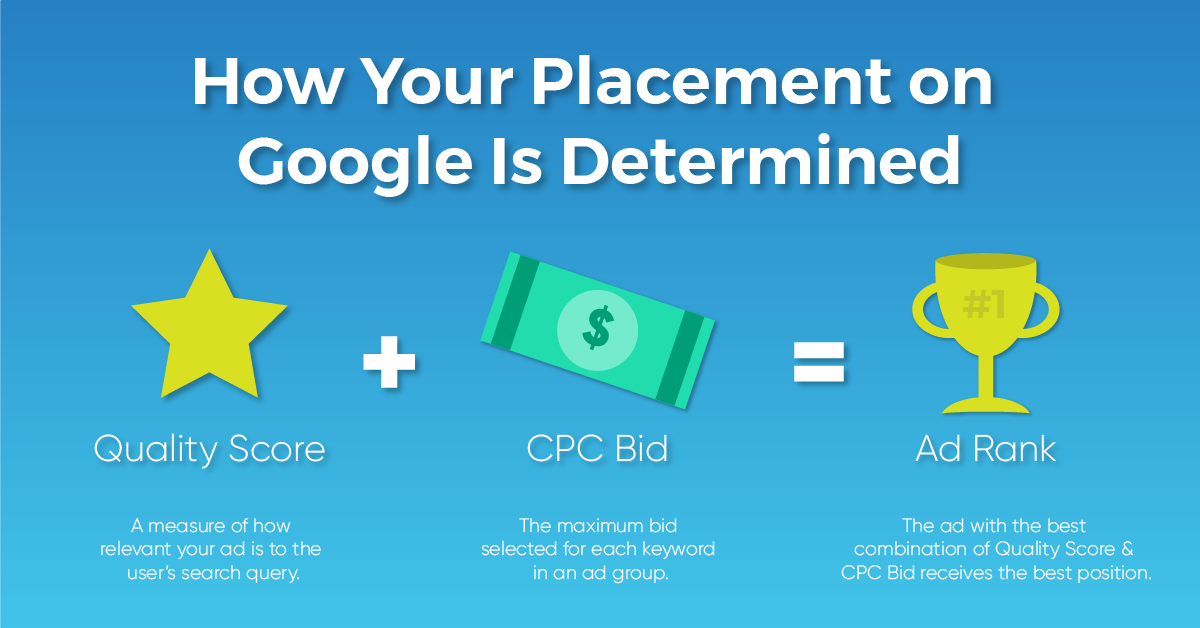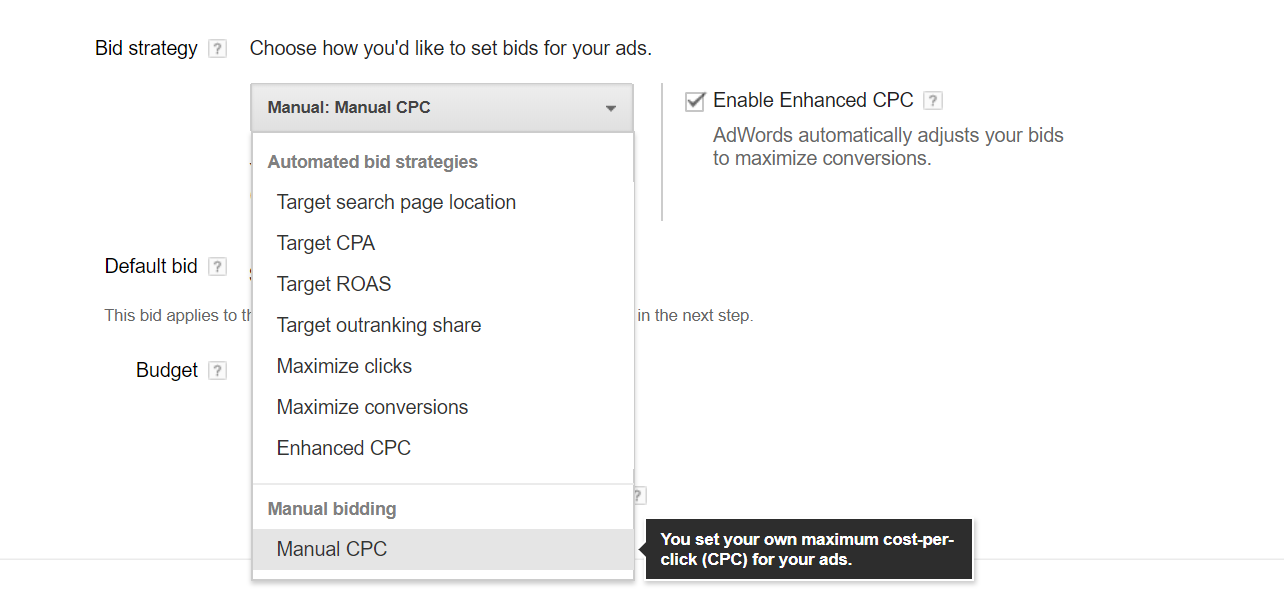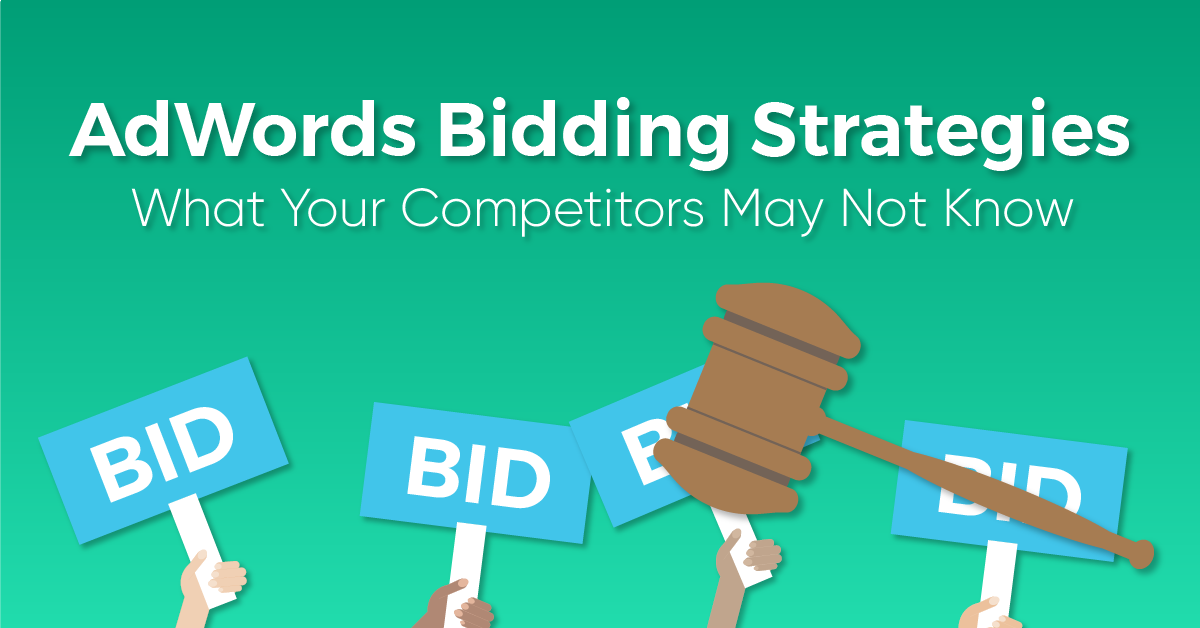AdWords Bidding Strategies – What Your Competitors May Not Know
Where your ad ranks on Google is obviously a key factor in the performance of your marketing campaigns in Google AdWords. There are two primary measures Google looks at to determine this:
1) Quality Score
2) Your Bid
The components of Quality Score could be broken down in another post, but today we’ll take a look specifically at bidding strategies. We’ll break down some important metrics to consider when bidding as well as the various types of bidding available to you in AdWords.
Metrics are an important part of any bidding strategy because they are going to inform the decisions you make for each bid you set. Getting a grasp on the different types of bidding settings available to you in AdWords will also help you better manage your ad spend. These practices will help give you an edge when competing in the auction for ad rank.

Important AdWords Metrics to Consider
ROAS Goals
Understanding what you are willing to spend per click is central to your bidding strategy, and you can determine that by taking a look at your ROAS (Return On Ad Spend) goals. If you know that you are willing to spend no more than $20 per lead or sale and the average sale will net you $60, then you have a ROAS goal of 3x ($60/$20).
Once you determine your conversion rate, you can then determine the amount you are willing to pay per click. In the above case, if you have a conversion rate of 5% from this traffic, meaning one in every twenty clicks is converting, you are going to need a CPC of less than $1 in order to reach your CPA goal of $20 or less as outlined above.
Performance By Device
As we see an increasing shift towards mobile usage, segmenting your data and bidding according to device is a key aspect of PPC bidding strategy. In AdWords, this is done in the Settings tab under Devices. You can see a side by side comparison by device type for each campaign and implement Campaign or Ad Group level bid adjustments to raise or lower bids accordingly.
Average Position
Knowing where you are currently sitting in terms of your ad rank in the auction is going to influence your bidding. For example, if you are already sitting lower at position 3 or 4, lowering your bids will sometimes lower your prominence so much that there is little reason to even run the campaign.
Paying attention to average position is also very important when you have an unlimited budget. If you are at a lower position and would like to raise bids considerably, keep in mind that not only will your CPCs go up, but likely your CTRs as well. This can raise spend quickly. Being aware of your average position and how that might have impacted the data you are looking at will help you make a more informed bid change.
Click-Through-Rates
This relates to the section above but it is important to understand that CTRs are an important metric, and there are ways to raise your CTR other than upping your bids. Bidding higher just to improve CTR can easily backfire–if CPCs were raised significantly because of this, it could bump up your overall CPA (Cost-per-acquisition or conversion) and make the campaign unprofitable. In this case, you’re left with higher CTRs but a lower ROI. Not a good tradeoff. Focusing on upping your CTRs through good ad copy and split testing is generally a better way to go.
Est 1st and Top of Page Bids
Est 1st and Top of the Page Bids estimates give you an idea as to what you would need to bid in order to make it onto the first page or #1 position. These can be handy and the Est. 1st page bid will alert you, in the Keywords tab, of any keywords that are projected to have too low of a bid. It is important to keep in mind that these are not 100% accurate but can be good reference points and give you an idea of what you should be setting your bids at.
AdWords Bidding Strategies
Manual CPC
Manual CPC gives you the most control over your bidding strategy. It allows you to set a distinct bid for each and every keyword. With this option, you don’t have to be concerned about AdWords spending any more per click than the amount you designate.

Here is a screenshot of the bidding strategy setting in Google AdWords.
Enhanced CPC
Enhanced Cost-Per-Click, or ECPC, is one of AdWords’ Smart Bidding strategies. It gives AdWords the ability to raise bids when it detects that a click is more likely to lead to a conversion. It is a balance between having the control found in Manual CPC with some of AdWords automation features found in more advanced bidding strategies.
Target Search Page Location
As more of a “set it and forget it” kind of approach, the Target Search Page Location in AdWords will automatically raise bids to ensure you are at a specific position or page in the search results. You can choose between 1) Top of the first search results page or 2) Anywhere on the first search results page. Keep in mind there is no guarantee that you will get a certain position, but in general, this setting will help you achieve those goals if that’s all you are looking for.
Target CPA
Target CPA offers one of the more advanced features in AdWords, using the companies machine learning to automate your bids. Based on the CPA you’ve calculated, as discussed above in the metrics section, Adwords will make auction-time adjustments to your bids, raising your bids when it figures the click will be more likely to result in a conversion. This is similar to the Enhanced CPC strategy outlined above but Target CPA gives even more control to AdWords. You are essentially giving the platform your goal and letting the data and computers do the rest.
Target ROAS
Target ROAS (Target Return on Ad Spend) is a similar option to the Target CPA setting above. If you give AdWords a ROAS goal of 400%, it is going to try to obtain a conversion value of 4x the amount of your spend. The advanced setting will automatically set your max CPCs for you and look to obtain your target ROAS you designate.
Target Outranking Share
If you have a competitor you know you want to outrank in search results, the Target Outranking Share option lets you do just that. You set the “benchmark domain” you wish to outrank, enter the percentage of time you’d like to outrank that domain, and can set a maximum bid limit to ensure you don’t spend an excessive amount for any single click.
Maximize Clicks
Maximize Clicks is a bidding strategy that lets AdWords set your bids with the goal of getting the most clicks within your budget. Generally, it is going to lower your position while still ensuring prominence and impressions. If you have a limited budget this ideally would help you get the most out of it, as long as your conversion rates are not affected.
Maximize Conversion
Maximize Conversion is similar to the Target CPA and Target ROAS strategies as it allows AdWords to raise and lower bids according to whether or not it figures a click will result in a conversion. It is going to run the calculation for each and every auction with the intent on getting the most conversions for the budget you set. Maximizing conversions is generally a goal for most PPC strategies and this is giving Adwords control to try and achieve that for you.
Conclusion
Along with Quality Score, bidding is an essential part of the equation when it comes to how you compete in the auction every time someone searches for the keywords you’re targeting.
Having the right data in front of you helps you make informed decisions when adjusting bids. In this post, we covered some of those key metrics and outlined some of the various options available to you in AdWords as bidding strategies. AdWords offers a spectrum of choices depending on how much automation you’d like and how much control you’re willing to give up. This brief guide outlined those strategies and can help give you a competitive advantage for Ad Rank and improve your overall ROAS.
Additional questions
If you would like to learn more about bidding strategies or have any questions, contact us today or leave a comment below.
Ready To Grow?
Let's Talk!


